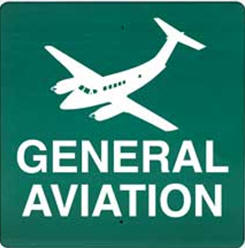 |
|
|
|
|
|
|
|
|
Impact of the Government Shutdown on General
Aviation
General Aviation is an industry that is heavily
regulated by the federal government. General aviation
aircraft and parts can’t be produced, financed, bought,
or sold without the written approval of the federal
government. In some cases, an aircraft can’t even move
without federal approval.
For decades, the United States has been the world leader
in every aspect of general aviation from production to
operation. It is a key part of our nation’s
manufacturing base and is one of the few industries
making a positive impact on our balance of trade. It is
also predominately an industry of small businesses. In
every corner of America, small companies sell fuel,
build hangars, and broker airplane transactions. Over
1.2 million Americans owe their livelihood to general
aviation. The government shutdown is quickly strangling
one of America’s most significant but fragile industries
– general aviation.
The impact of the government shutdown is wide reaching
and evolving. This information will be updated as NBAA
Members and other aircraft operators submit impact
reports to NBAA.
Federal Aviation Administration (FAA)
By
closing the FAA Registry in Oklahoma City, the
government shutdown has effectively brought to a halt
the U.S. general aviation industry and is jeopardizing
the future of thousands of U.S. small businesses.
The closure of the FAA Aircraft Registration Branch due
to the Federal Government shutdown has halted virtually
all business aircraft related transactions. The
following specific examples illustrate the harmful
impact of the FAA Registry shutdown:
Aircraft Purchase/Sale Impacts
-
With the inability to register airplanes, some buyers
are reconsidering their purchase decision all together
and actually trying to get out of deals due to concerns
about the pending debt ceiling issue.
-
International aircraft deals are suffering because
buyers cannot import/export aircraft. With the registry
closed, U.S. registered aircraft will begin to look less
attractive as foreign buyers won’t be able to close
transactions.
-
Many buyers have date specific slots for aircraft
repairs/modifications right after the deal closes. With
the registry closed, buyers will likely decide to delay
or postpone these upgrades all together.
-
If the buyer is planning to obtain financing, the
finance company only guarantees interest rates/terms for
a certain period, with the Registry closed these
financing agreements will expire.
-
Any transactions using like kind exchanges (1031
exchanges) will be threatened as there are specific
timeframes regarding FAA registration that must be met
in order to complete the exchange process.
Aircraft Operations Impacts
-
Airplanes that had modification work done which included
a new tail numbers/registration are now grounded at
maintenance facilities because FAA cannot process the
registration.
-
According to FAA data, 10,000 aircraft registrations
expire each month- this means all aircraft with
registrations that expire in October will be grounded.
-
Aircraft that are operating with a “pink slip” or fly
wire will be grounded once those items expire (generally
valid for 90 days).
-
Flight Standards District Offices (FSDOs) are
effectively closed to operators – commercial and
non-commercial alike – who require FAA authorizations to
conduct specific operations.
Aircraft Training Impacts
-
Training Center Evaluator (TCE) qualifications have
expired/are expiring – leading to grounded pilots.
-
Dozens of training center evaluators’ qualifications
have expired. At the end of the October, several hundred
additional TCE’s qualifications will expire making it
impossible to schedule or conduct critical training
activities. This will impact the entire US aviation
system as both initial and recurrent qualifications for
full flight simulators have been cancelled and will be
cancelled as the shutdown continues. The lack of
simulation resources will further impact the flight
training industry’s ability to train pilots. Review a
letter from eight aviation organizations to the FAA
Associate Administrator for Aviation Safety.
-
FAA Has Halted Knowledge Tests.
-
NBAA has learned that FAA testing sites received
notification stating that aviation knowledge testing
must be halted after Friday, Oct. 14, 2013.
Treaty, Security and Other Implications
-
The U.S. needs to be responsive to registry inquires
from other countries due to treaty obligations, with the
registry closed we cannot meet these obligations.
-
The FAA Registry needs to have current and accurate
information on all aircraft for safety, security and law
enforcement reasons. With the registry closed these
requirements are not being met.
-
The FAA Registry has already seen its staffing levels
decreased, the backlog created by this shutdown will
take a significant amount of time to process.
Customs and Border Protection (CBP)
CBP is affected only with overtime arrivals, much like
what happened with sequestration. Operators should
communicate directly with their port of entry to clarify
any local port impacts on proposed arrival times,
especially if the operation proposes to arrive after
normal business hours.
Transportation Security Administration (TSA)
TSA is working normal business hours. This includes
administrative functions needed to support TSA waiver
applications and approval process that support foreign
registered aircraft and the DCA Access Standard Security
Program (DASSP). Additionally, the coordination needed
with FAA for DCA slots remain operational.
Department of Transportation (DOT)
The DOT office that manages the following functions is
closed due to the government shutdown:
-
Notice of Consistency
-
US Air Carrier Frequency Allocations
-
US Air Carrier Charter Allocations
-
US Carrier International Route Authority
-
DOT 375 Exemptions
- DOT 49 USC 41301 Exemption
|
||||
|
|
||||


